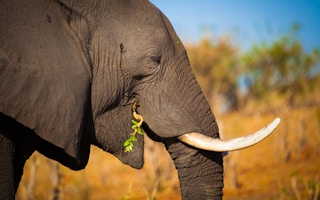To help close these knowledge gaps, IIED sponsored five Chinese journalists’ travel to Kenya in February 2014 to investigate sustainable development issues associated with China’s engagement there. Their stories — listed below — have been published in various Chinese newspapers and online media, including one primetime documentary on ivory trade on CCTV, China’s main TV channel.
To hear their insights on China’s role in Africa and their reflections on the trip, I met with the five journalists in Beijing last month. Three key takeaways are worth recounting:
1. Journalists’ responsibility to educate Chinese consumers
“Ivory is a sign of wealth for Chinese consumers, thus the societal opinion matters,” one journalist who researched ivory trade spoke of the power of media to shape Chinese consumer preferences. After visiting a Kenyan national park and a ranger station, he realised the disastrous effects of illegal poaching and ivory trade on local elephants and communities. He still remembered the rhetorical question of a park ranger: “How would you feel if we went to kill your pandas?”
Back in China, this journalist started tracing the illegal ivory trade supply chain to the end consumers. He interviewed Chinese police forces investigating the trade as well as convicted Chinese ivory traders (his documentary here on China’s central TV channel; it has received estimated 500,000 viewers live and 10,000 more in download). An interviewee says in the documentary, “many people in China do not realise that one needs to kill an elephant to get ivory”. Therefore, Chinese journalists can play an important role in shaping public opinion by telling the true stories behind the products.

Chinese journalists interview a project manager of Nairobi Elephant Orphan Nursery. Image: YiDe Media
2. Looking at Africa, reflecting on China
For the journalists, Africa served as a mirror into China’s own environmental issues. As they delved deeper into discussing Africa’s sustainability challenges, they also reflected on China’s situation. For instance, after witnessing how a large Chinese mining company in Zambia was required to conduct a stringent environmental impact assessment, one of the journalists lamented China’s poor domestic enforcement. He asked rhetorically: “Why can’t we do that in China?”
“
How would you feel if we went to kill your pandas?”
In another instance, an experience in Kenya reminded the journalists of the role of civil society in protecting the environment. After visiting Karura Forest — an urban forest in Nairobi whose conservation was made possible through civil society movements led by Nobel laureate Wangari Maathai — one of the journalists praised Karura as an example of civil society’s power in solving environmental problems and expressed hope for something similar to happen in China.
3. Do away with the China-centric perspective
The journalists questioned the ‘China-centric’ approach China tends to take in dealing with African nations — with China as the big brother and superior economic power vis-à-vis African countries. One journalist said: “In order to truly understand African nations, we must change the China-centric perspective and learn to treat them as equals”. The journalists desire to understand Kenya through the eyes of local people – for example by visiting the Kibera slum and markets for the poor – was indicative of how such a new approach to view Africa should look like.
After a day with the journalists I was struck by their openness, ability to reflect critically, desire to understand Kenya from the perspective of local people and willingness to see Africa as an equal partner in the China-Africa relationship. In an era of Chinese consumption patterns impacting natural resources and biodiversity across the world, they represent a new generation of Chinese journalists “going out” to witness China’s footprint and to educate the Chinese public about their overseas impacts.
At IIED, we work to promote sustainable and socially beneficial forms of Chinese engagement with Africa (learn about our work here). In addition to generating evidence and informing policymakers, we believe that our initiatives to make Chinese voices from the field heard and to raise awareness among the Chinese public are crucial steps toward the right direction.
Xue Weng is a researcher at IIED (xiaoxue.weng@iied.org). This post originally appeared in the IIED blog.








